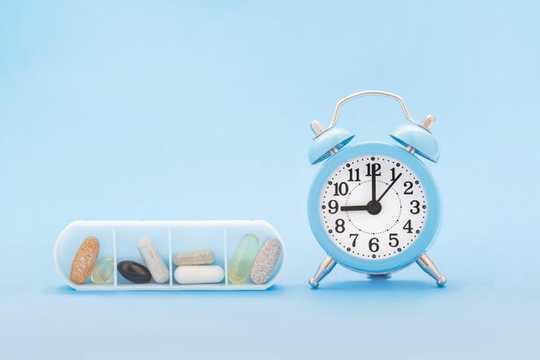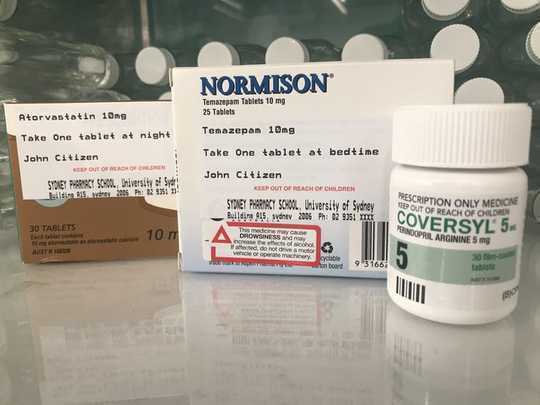
Does it matter if you take your medicine morning, noon or night? That depends on a number of factors. from Kat Ka/www.shutterstock.com
Whether you need to take a drug at a specific time of day depends on the medication and the condition you are treating. For some medicines, it doesn’t matter what time you take it. And for others, the pharmacist may recommend you take it at the same time each day.
But we estimate that for around 30% of all medicines, the time of day you take it does matter. And a recent study shows blood pressure medications are more effective if you take them at night.
So, how do you know if the timing of your medication is critical?
When timing doesn’t matter
In most cases, it’s not important when you take your medicine. For instance, you can take non-drowsy antihistamines for hay fever, or analgesics for pain when you need them. It doesn’t matter if it is morning, noon or night.
Get The Latest By Email
What is more important is the time interval between each dose. For instance, paracetamol needs to be taken at least four hours apart, any closer and you run the risk of taking a toxic dose.
Even when a medication doesn’t need to be taken at a particular time, the pharmacist may still recommend you take it at the same time every day anyway.
This daily pattern helps remind you to take it. An example is taking the oral contraceptive at the same time each day, simply out of habit.
For the mini pill, taking it at the same time is actually necessary. But the actual time of day can be whatever works best for you.
When does it matter?
It may seem fairly obvious to take some medicines at particular times. For example, it makes sense to taking sleeping medications, such as temazepam, at night before you go to bed.
Some antidepressants, such as amitryptyline or mirtazapine, have drowsy side effects. So it also makes sense to take them at night.
For other medicines, taking them in the morning is more logical. This is true for diuretics, such as furosemide, which helps you get rid of excess fluid via your urine; you don’t want to be getting up in the night for this.

When a medicine needs to be taken at a specific time, this will be indicated on the box. Author provided
For other medications, it’s not obvious why they have to be taken at a particular time of day. To understand why, we have to understand our circadian rhythm, our own internal body clock. Some systems in our body work at different times of day within that rhythm.
For instance, the enzymes controlling cholesterol production in your liver are most active at night. So there may be some benefit to taking lipid (cholesterol) lowering drugs, such as simvastatin, at night.
Finally, sometimes it’s important to take medications only on particular days. Methotrexate is a medicine used for rheumatoid arthritis and severe psoriasis, and the timing of this medication is critical.
You should only take it on the same day once a week, and when taken this way it is quite safe. But if you mistakenly take it daily, as happened recently with a patient in Victoria, then it can cause serious illness or even death.
What about blood pressure medicines?
One of the ways the body regulates blood pressure is through a pathway of hormones known as the renin, angiotensin and aldosterone system.
This system responds to various signals, like low blood pressure or stressful events, and controls blood volume and the constriction of blood vessels to regulate your blood pressure.
Importantly, this system is more active while you’re asleep at night. And a recent study, which found blood pressure medication is more effective at night, may change the way we use medicines to treat high blood pressure.
Two types of drugs typically prescribed to lower blood pressure are angiotensin converting enzyme (ACE) inhibitors, such as perindopril, and angiotensin receptor blockers (known as ARBs), such as irbesartan. These drugs dilate blood vessels (make them wider) to reduce your blood pressure.
Until now, doctors and pharmacists have often advised patients to take these medications in the morning, assuming it’s good to have a hit of the drugs when you’re up and about.
But this study found taking blood pressure medications at night produced a significant reduction (45%) in heart disease, including fewer strokes, heart attacks and heart failure compared to taking them in the morning.
Taking them at night also meant people’s blood pressure was better controlled and their kidneys were healthier.
So if you take one of these drugs to control your blood pressure and aren’t sure what you should do, talk to your pharmacist or doctor. While evidence is building to support taking them at night, this might not be appropriate for you.
About the Authors
Nial Wheate, Associate Professor | Program Director, Undergraduate Pharmacy, University of Sydney and Andrew Bartlett, Associate Lecturer Pharmacy Practice, University of Sydney
This article is republished from The Conversation under a Creative Commons license. Read the original article.
books_health







